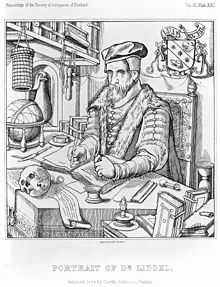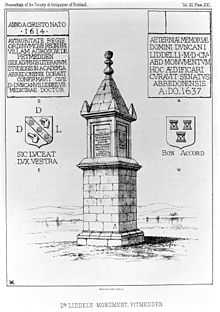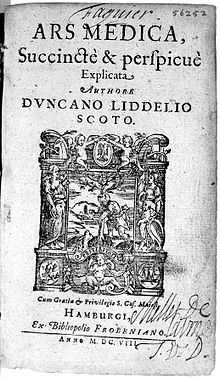Duncan Liddel
Duncan Liddel (1561–1613) was a Scottish mathematician and physician.

Life
Liddel was born in Aberdeen. Having received an education in languages and philosophy at the school and university there, he went abroad at age 18. After a few months he arrived at Frankfort-on-Oder, where a Scot, John Craig was teaching logic and mathematics; Craig superintended his studies.[1]
Three years later Craig returned to Scotland, and Liddel, on his advice, moved to Breslau in Silesia, where he studied mathematics under Paulus Wittichius, and encountered Andreas Dudith. In 1584 he returned to Frankfort, took pupils in mathematics and philosophy, and took up the study of physic. In 1587 an epidemic drove him to Rostock, where he became the friend of Johannes Caselius, Heinrich Brucaeus and Cornelius Martini; and received the degree of master in philosophy. With the help of his new contacts, he visited Tycho Brahe in 1587 and again the following year.[1][2][3]
Shortly after his return to Frankfort in 1590 Liddel joined the new university of Helmstadt, established by Duke Julius of Brunswick. Caselius had already been appointed to the chair of philosophy there. Next year Liddel obtained the lower mathematical chair vacated by Parcovius, and in 1594 he succeeded Erhardus Hoffmann in the higher mathematical chair. In 1596 he became M.D. of the university, and began publicly to teach physic and to act as præses at the recitation of medical dissertations. In 1599 he was dean of the faculty of philosophy; in 1603 he resigned his mathematical professorship, and in 1604 became pro-rector of the university.[1]
Liddel returned to Scotland in 1607, financially secure. In 1612 he endowed the university of Aberdeen with lands for the education and support of six poor scholars; and in 1613 he endowed a professorship of mathematics in Marischal College.[1] He died on 17 December 1613, at age 51. His funeral sermon was given by Gilbert Gray of Marischal College.[4]
Legacy
Liddel bequeathed his books and instruments to Marischal College. A brass memorial figure of him was later set up in the Kirk of St Nicholas, Aberdeen.[1]

Reputation
Liddel was reputed as a mathematician in Germany, where he was said to have been the first to teach the astronomy of Copernicus and of Tycho Brahe side by side with the Ptolemaic system.[1] Caselius considered that Liddel was the first teacher of Brahe's system; and Brahe complained of plagiarism.[3]
In theology, also, Liddel built a reputation. He found arguments against the Lutheran theologian Daniel Hofmann, who had deployed the doctrine of double truth at Helmstedt in a divisive fashion.[3]
Works
Liddel wrote medical books:[1]

- Disputationum Medicinalium Liber, Helmstadt, 1605; medical theses maintained by himself and his pupils, 1592–1605: the volume is dedicated to John Craig. A posthumous edition, under the title Universæ Medicinæ Compendium, was published at Helmstadt in 1720.
- Ars Medica, Hamburg, 1608, in five books—I. De Medicinæ Definitione et Principiis; II. De Physiologia; III. De Pathologia; IV. De Signorum Doctrina; V. De Therapeutica:’]—dedicated to James I of England. Another edition was published at Lyon in 1624 by Serranus; and in 1628 a third edition appeared at Hamburg. This and the next work were in the Galenic tradition of learned medicine, but admitted some Paracelsian doctrines.[3]
- De Febribus Libri tres, Hamburg, 1610; republished by Serranus with the Ars Medica in 1624.
- Tractatus de Dente Aureo, Hamburg, 1628, an exposure of a supposed miracle—a boy having a golden tooth—which had imposed on the credulity of Gregor Horstius.
- Artis Conservandi Sanitatem Libri duo, Aberdeen, 1651; edited by Patrick Dun.[5]
Notes
- ↑ 1.0 1.1 1.2 1.3 1.4 1.5 1.6
 Lee, Sidney, ed. (1893). "Liddel, Duncan". Dictionary of National Biography 33. London: Smith, Elder & Co.
Lee, Sidney, ed. (1893). "Liddel, Duncan". Dictionary of National Biography 33. London: Smith, Elder & Co. - ↑ Molland, George. "Liddel, Duncan". Oxford Dictionary of National Biography (online ed.). Oxford University Press. doi:10.1093/ref:odnb/16639. (Subscription or UK public library membership required.)
- ↑ 3.0 3.1 3.2 3.3 Andrew Pyle (editor), The Dictionary of Seventeenth Century British Philosophers (2000), Thoemmes Press (two volumes), article Liddel, Duncan, p. 517–9.
- ↑ Burns, J. H. "Gray, Gilbert". Oxford Dictionary of National Biography (online ed.). Oxford University Press. doi:10.1093/ref:odnb/11338. (Subscription or UK public library membership required.)
- ↑ Vance, Shona MacLean. "Dun, Patrick". Oxford Dictionary of National Biography (online ed.). Oxford University Press. doi:10.1093/ref:odnb/66918. (Subscription or UK public library membership required.)
Attribution
![]() This article incorporates text from a publication now in the public domain: Lee, Sidney, ed. (1893). "Liddel, Duncan". Dictionary of National Biography 33. London: Smith, Elder & Co.
This article incorporates text from a publication now in the public domain: Lee, Sidney, ed. (1893). "Liddel, Duncan". Dictionary of National Biography 33. London: Smith, Elder & Co.